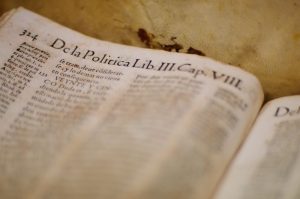Das iiif Consortium und die weitere iiif Community haben Standard-Protokolle definiert, wie man sie in der Darstellung von Bildressourcen benötigt. Die Protokolle sind als Beschreibungen von «Schnittstellen» formuliert, d.h. es wird beschrieben, unter welcher Adresse, mit Hilfe welcher Parameter der Dienst eine bestimmte Funktion anbieten soll. In dieser Weise gibt es Beschreibungen von Zoom-/Rotations-/Ausschnitts-/Format-Konversions- und ähnlichen Diensten in der iiif image API, die aktuell in Version 2.1.1 vorliegt. Ferner Beschreibungen von Zugangsmanagement- und Authentifikationsservices sowie von Such-Funktionen in der Authentication API bzw. der Search API, beide jüngeren Datums und erst in der Version 1.0 vorliegend. Beschreibungen von Video- und Audio-Daten (z.B. für die in diesem Fall hinzukommenden Zeit-Indices der Ressourcen) sind in Vorbereitung.
Continuar leyendo «(Alemán) iiif in der Schule von Salamanca»

 Speaker: Juan Belda Plans [website:
Speaker: Juan Belda Plans [website: 